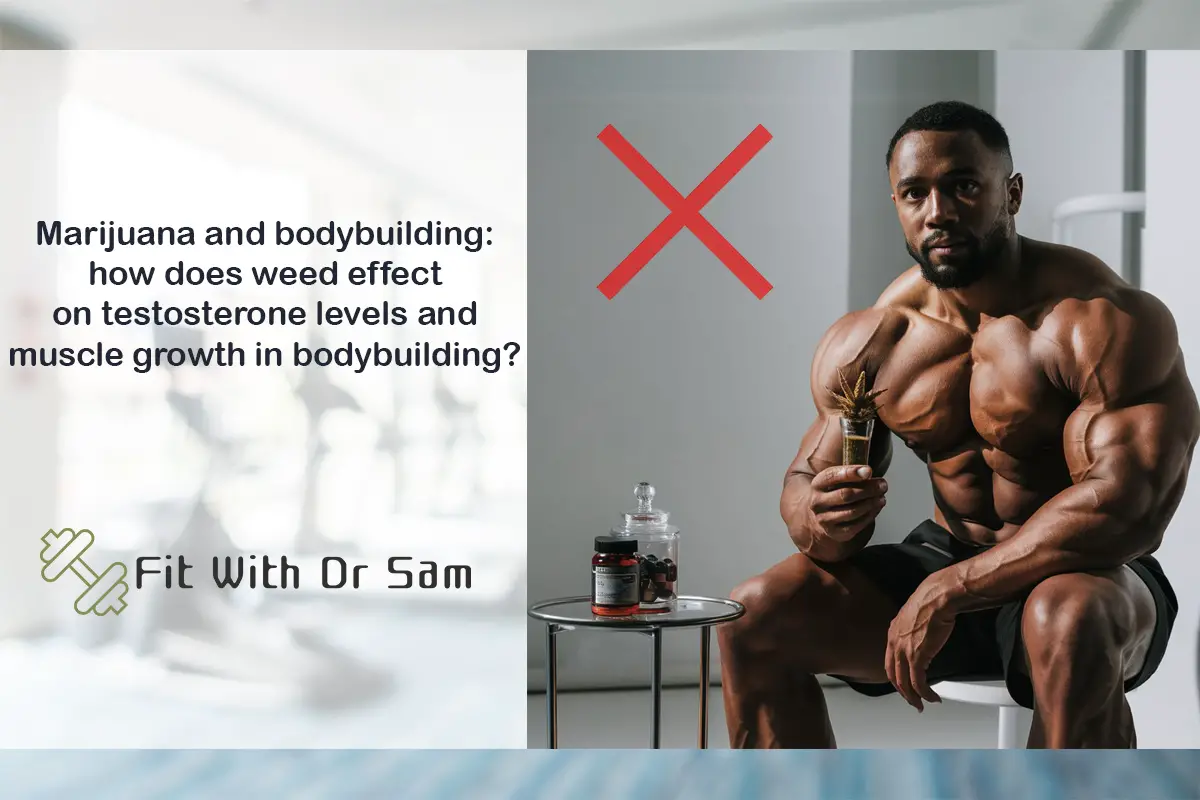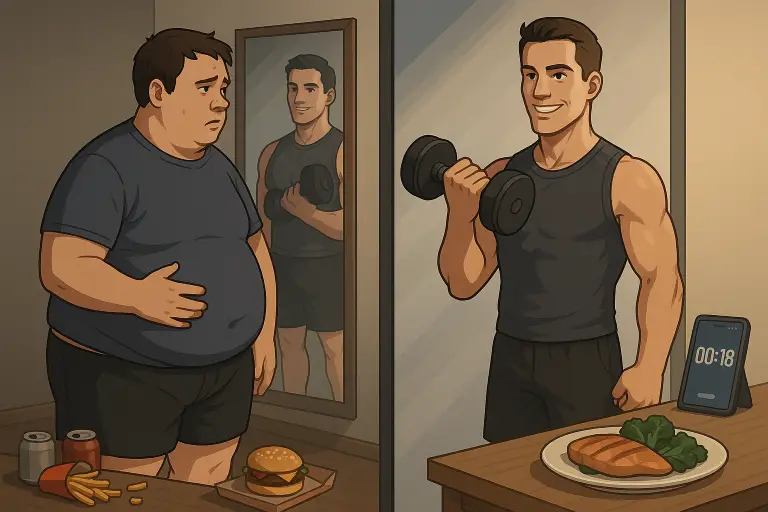Marijuana (weed) effect on muscle growth in bodybuilding

Marijuana, also known as weed or cannabis, is a widely used recreational drug. The use of marijuana dates back thousands of years, with early civilizations utilizing it for medicinal and recreational purposes. Its effects on the human body have been debated for centuries. Lately, its impact on different physiological aspects, such as hormone levels has been under a lot of debate. In this article we are going to explore the impacts of Marijuana on testosterone levels and muscle growth in bodybuilding to learn the truth from myth, providing evidence and research based information and addressing common questions on this subject. So without further ado let’s get started.
What does Marijuana contain?
Before examining the effects of weed on bodybuilding and muscle growth, first let’s learn a little more about its components. Marijuana contains over 100 cannabinoids, with tetrahydrocannabinol (THC) and cannabidiol (CBD) being the most prominent ones. THC is the psychoactive component that makes you feel “high” when you smoke a joint, while CBD is known for its potential therapeutic benefits.

How does Marijuana impact testosterone levels?
Testosterone is an important hormone that directly affects muscle growth by influencing protein synthesis and muscle repair. That is why it’s considered as an important factor for bodybuilders and gym enthusiasts. You can also read extra tips to boost your testosterone level naturally on Increase Testosterone Grocery Guide. But how does smoking weed affect your body’s testosterone levels?
Well, studies have actually shown mixed results on this matter. In fact, Marijuana can cause a temporary decrease in testosterone levels but its long-term effects are still unclear and may vary from one person to another [4].
Can occasional use of marijuana Affect my muscle gain?
Occasional uses of marijuana are less likely to negatively influence your muscle gain. However, studies have proven that results vary greatly for each individual. So your body could highly react while someone else’s might not be as affected [5].
Marijuana and muscle growth; taking a deeper look on the mechanism
Muscle growth is a multifaceted matter that depends on various factors including hormone levels, protein synthesis, recovery and so on. Marijuana’s impact on each of these is complex and not yet fully understood.
Effects on protein synthesis
THC has been shown to influence the endocannabinoid system, which plays a role in various physiological processes, including appetite and metabolism. However, there is no proven evidence that marijuana can directly affect protein absorption or significantly effect protein synthesis.
Does weed increase my appetite?
Yes, Marijuana can in fact affect your appetite and make you want to eat more. That is why some of bodybuilders use weed in their bulking phase to help them gain more weight.
A 2020 study published in the “European Journal of Preventive Cardiology” found that regular cannabis users had a higher body mass index (BMI) and greater muscle mass compared to non-users, suggesting a possible positive effect on muscle growth. However, the study also noted that the relationship is likely influenced by increased caloric intake and not a direct anabolic effect of cannabis [6].

How does Marijuana impact the recovery phase?
Recovery phase is an important part of muscle hypertrophy and getting an adequate amount of sleep plays a crucial role in this process. Marijuana is often used to aid sleep however its effects could be double sided.
In fact, many users find weed relaxing and claim that it helps them fall asleep better. However, various studies have shown that long-term use might negatively affect sleep patterns [7,8]. So While marijuana can help with sleep, it’s essential to consider potential side effects and individual responses.
Research published in “Sleep Medicine Reviews” suggests that while THC might help users fall asleep faster, it can reduce the REM (rapid eye movement) stage of sleep, which is crucial for cognitive function and overall recovery [9]. Furthermore, a 2021 study in “Frontiers in Pharmacology” indicated that while short-term cannabis use might improve sleep, chronic use could lead to sleep disturbances [10].
Potential risks
While marijuana can sometimes help with your appetite or help you fall asleep, you shouldn’t ignore its potential risks and side effects for your overall health.
Can marijuana Affect my cardiovascular health?
Marijuana can have cardiovascular effects, such as increasing heart rate and blood pressure. Long-term use and smoking can also impact lung health. So It is advised to stay away from smoking weed specially if you already have cardiovascular problems such as high blood pressure.
Short term effects
When a person smokes marijuana, THC quickly passes from the lungs into the bloodstream. The blood carries the chemical to the brain and other organs throughout the body.
Marijuana over activates parts of the brain that contain the highest number of these receptors. This causes the “high” that people feel. Other effects include [11,12,13]:
- altered senses (for example, seeing brighter colors)
- altered sense of time
- changes in mood
- impaired body movement
- difficulty with thinking and problem-solving
- impaired memory
- hallucinations (when taken in high doses)
- delusions (when taken in high doses)
- psychosis (risk is highest with regular use of high potency marijuana)
Long-term effects
- Marijuana affects brain development. When people begin using marijuana as teenagers, the drug may impair thinking, memory, and learning functions and affect how the brain builds connections between the areas necessary for these functions. Researchers are still studying how long marijuana’s effects last and whether some changes may be permanent.
- Marijuana smoke irritates the lungs, and people who smoke marijuana frequently can have the same breathing problems as those who smoke tobacco. These problems include daily cough and phlegm, more frequent lung illness, and a higher risk of lung infections.
- Regular, long-term marijuana use can lead some people to develop Cannabinoid Hyperemesis Syndrome. This causes users to experience regular cycles of severe nausea, vomiting, and dehydration. So even though marijuana can increase your appetite it can actually lead to weight loss through this process.
Is it worth trying marijuana for muscle growth?
Considering the fact that A well-structured diet and training program, coupled with adequate rest and proper supplementation is all you need for a significant muscle growth, and also looking at marijuana’s possible side-effects and potential risks, using it for increasing your appetite or helping you with muscle gain doesn’t seem logical. Focus on a balanced diet rich in protein, a well-structured training regimen, adequate rest, and consider using proven supplements instead of turning to weed.
Conclusion
Marijuana’s effects on testosterone levels and muscle growth are complex and can vary among individuals. While there may be some benefits, such as increased appetite and improved sleep for some users, the potential risks and individual responses (Impaired brain development, mental health problems such as psychosis and schizophrenia, addiction, respiratory problems, risk of heart attack and stroke) should be carefully considered. Alternatives like proper nutrition and supplements can also support muscle growth effectively without the potential downsides of marijuana use. If you think smoking pot will help you gain mass, muscle, or weight, you might want to reconsider!
References:
- [1] https://www.muscleandfitness.com/features/active-lifestyle/marijuanas-effects-your-weight-training-mission-build-more-muscle-and-strength/
- [2] https://www.wikileaf.com/thestash/cannabis-and-muscle-mass/
- [3] https://1stdetachment.com/blogs/health-fitness/bodybuilding-and-cannabis
- [4] Barnett, Gene, Chia-Whei N. Chiang, and Vojtech Licko. “Effects of marijuana on testosterone in male subjects.” Journal of theoretical biology 104.4 (1983): 685-692.
- [5] Haney, Margaret, et al. “Dronabinol and marijuana in HIV+ marijuana smokers: acute effects on caloric intake and mood.” Psychopharmacology 181 (2005): 170-178.
- [6] Piepoli, Massimo F., et al. “Update on cardiovascular prevention in clinical practice: a position paper of the European Association of Preventive Cardiology of the European Society of Cardiology.” European journal of preventive cardiology 27.2 (2020): 181-205.
- [7] Choi, Seulah, Barry C. Huang, and Charlene E. Gamaldo. “Therapeutic uses of cannabis on sleep disorders and related conditions.” Journal of Clinical Neurophysiology 37.1 (2020): 39-49.
- [8] Babson, Kimberly A., James Sottile, and Danielle Morabito. “Cannabis, cannabinoids, and sleep: a review of the literature.” Current psychiatry reports 19.4 (2017): 1-12.
- [9] Suraev, Anastasia S., et al. “Cannabinoid therapies in the management of sleep disorders: a systematic review of preclinical and clinical studies.” Sleep medicine reviews 53 (2020): 101339.
- [10] Walsh, Kenneth B., Amanda E. McKinney, and Andrea E. Holmes. “Minor cannabinoids: biosynthesis, molecular pharmacology and potential therapeutic uses.” Frontiers in Pharmacology 12 (2021): 777804.
- [11] Bromberg, Walter. “Marihuana intoxication: A clinical study of Cannabis sativa intoxication.” American Journal of Psychiatry 91.2 (1934): 303-330.
- [12] Atakan, Zerrin, et al. “The effect of cannabis on perception of time: a critical review.” Current pharmaceutical design 18.32 (2012): 4915-4922.
- [13] Montgomery, C., Seddon, A. L., Fisk, J. E., Murphy, P. N., & Jansari, A. (2012). Cannabis‐related deficits in real‐world memory. Human Psychopharmacology: Clinical and Experimental, 27(2), 217-225.






Your point of view caught my eye and was very interesting. Thanks. I have a question for you.